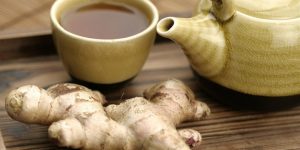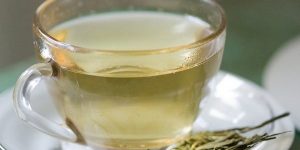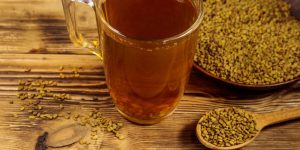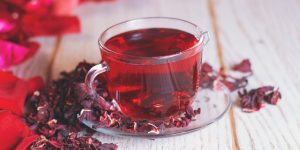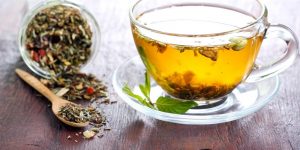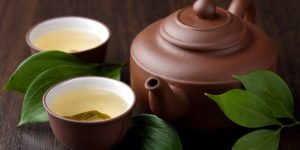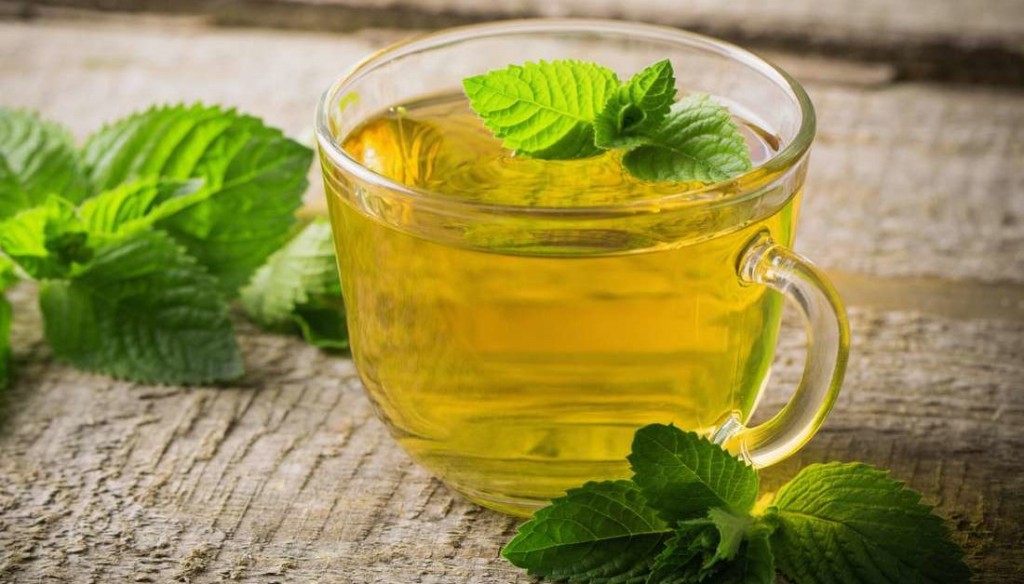
O peppermint tea It has been used for centuries around the world as natural remedies for a wide variety of ailments and to support overall health and well-being.
Herbalists, nutritionists and other health professionals recommend peppermint tea as a treatment for various illnesses and as a general health tonic.
Just the aroma of peppermint tea (or peppermint oil) can relieve headaches and colds. Think of it as aromatherapy in your cup of tea.

Quick Facts
Origin: peppermint plant native to Europe
Temperature: hot or cold
Caffeine: None
What is peppermint tea?
O peppermint tea it can be made with dried leaves of peppermint plants or can be black, green or white with peppermint leaves or oil.
It is a tea aromatic that can magically warm you on a cold day or cool you down when it's hot. Additionally, archaeologists have found dried peppermint in Egyptian pyramids dating back to 1000 BC.
Benefits of peppermint tea:
While there is plenty of anecdotal evidence to support the benefits of peppermint tea For health, little real research supports these claims. Still, with no known adverse effects, a cup of peppermint tea It may be just what the doctor prescribes. ((https://doi.org/10.1016/j.apjtb.2015.05.007))
Relieves headaches
O peppermint tea can relieve headaches caused by stress or poor diet. These headaches typically constrict blood vessels in the brain and, like pharmaceutical painkillers.
It opens, potentially bringing relief to headache sufferers. Also, the next time you feel the rumble of a headache, try reaching for some fresh or dried peppermint leaves instead of aspirin or other pain relievers.
After a few minutes of soaking and sipping, you may find that the pain disappears without any side effects or unnecessary medications.
Cleans sinuses
Menthol, the naturally occurring chemical that gives peppermint its refreshing, warm taste and sensation, may help combat sinus problems. 1 It soothes inflamed mucous membranes in the sinuses and throat.
Thins mucus, making it less likely to block the sinuses and prevent comfortable breathing; and acts as a decongestant, eliminating phlegm and mucus congestion. Inhale the steam from a hot cup of peppermint tea before drinking it.
Soothes an upset stomach
O peppermint tea may help relieve gastrointestinal ailments including upset stomach, cramps, heartburn, gas/flatulence, indigestion, and diarrhea.
It also promotes healthy digestion and works best after a meal; before bed, especially if you had a late dinner and had heartburn; or at the beginning of stomach problems.
Some studies show that peppermint oil effectively treats irritable bowel syndrome (IBS). And some doctors believe that drinking tea of mint regularly may lessen symptoms.
Benefits the immune system
Because of the antiviral and antimicrobial properties of peppermint. Furthermore, the tea of mint can kill harmful bacteria in the upper respiratory tract.
Enjoy a pint or two of peppermint tea When you start to feel unwell you can ward off an oncoming cold.
Uses of peppermint tea
O peppermint tea It can be served hot or cold and enjoyed at any time of the day. Plus, its invigorating aroma can help you wake up in the morning and can aid digestion after a big meal.
O tea Mint can make you more mentally alert (despite being naturally caffeine-free), improve memory recall, and reduce stress.
It has also been shown to help passengers drive more safely (its calming effect can reduce traffic-related frustration) and ease anxiety in test takers.
The antispasmodic effect of menthol relieves the contraction of muscles especially those on the walls of the uterus. Drinking two or three cups of peppermint tea a day in the days leading up to and during menstruation helps relieve menstrual cramps in many women.
The toothpaste you use is probably peppermint-scented, just like the mints you put in your mouth after a meal to freshen your breath.
This is because peppermint has antibacterial properties that kill germs. Which cause dental plaque, which in turn makes a person's breath better. To drink peppermint tea can help make your mouth cleaner and freshen your breath.((https://bmccomplementmedtherapies.biomedcentral.com/articles/10.1186/s12906-018-2409-0 ))
How to drink peppermint tea:
Prepare the peppermint tea using a tea bag, dried leaves or crushed fresh mint. Furthermore, the water must be hot, but not boiling, and the tea It should steep for 5 to 7 minutes to get the full flavor.
Start with fresh or dried peppermint leaves. You need about 1 tablespoon of crushed fresh leaves or 1 tablespoon of tea or dry leaf tea bag per cup of fresh water.
Peppermint gives the impression of sweetness, making sugar unnecessary, although you can add some to taste. (Try some honey to soothe a sore throat).
You can mix peppermint with other herbs when preparing herbal tea. It's delicious with lavender, another stress reducer; ginger, a digestion aid; and fennel seeds, a main ingredient in detox tea.
Caffeine Content in Peppermint Tea
The caffeine content in peppermint tea It depends on whether it is made exclusively with dried mint leaves. Also, whether mint leaves or oil are added to black, green or white tea leaves.
Pure peppermint does not contain caffeine. An 8-ounce cup of black tea contains about 47 milligrams of caffeine; a similar portion of Green Tea contains about 25 milligrams.
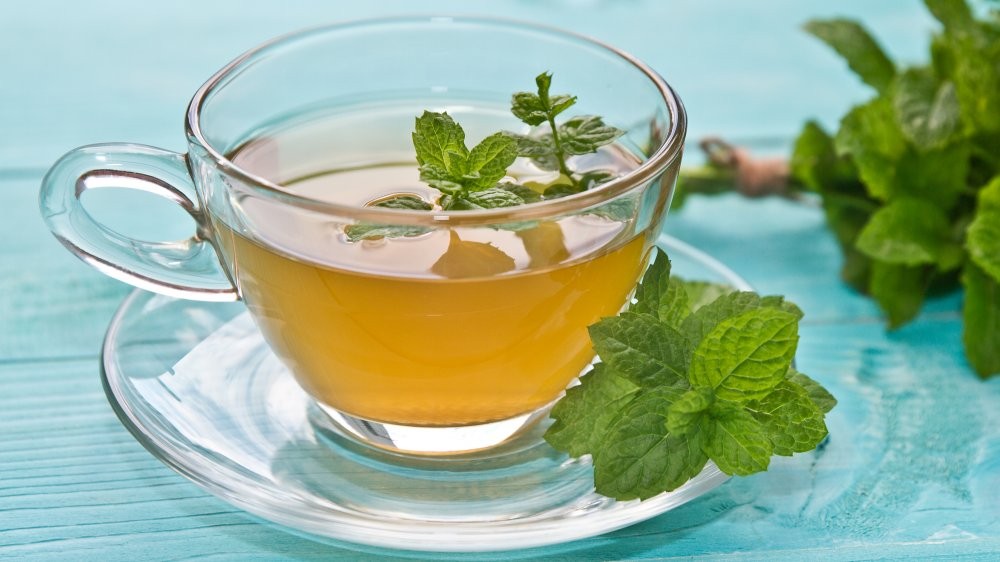
Buying and storing
You can buy fresh mint year-round in many supermarkets. Also, store it wrapped in a damp paper towel in the refrigerator for a few days.
Dried mint is also widely available and you can find peppermint tea in tea bags. In the bulk section of many supermarkets or through online or specialty tea retailers.
Store dried mint or peppermint tea in an airtight container. Additionally, it starts to lose potency after about a year.
Side effects
O peppermint tea It is generally considered a natural, effective and very safe remedy. However, it has some potential side effects. Avoid tea if you suffer from GERD.
The relaxing properties can cause the sphincter muscle in the stomach and esophagus to relax, exacerbating acid reflux. You can also avoid peppermint tea if you are pregnant.
In rare cases, it may interact with medications. Additionally, if you are concerned about a possible drug interaction, check the medication warnings or consult your doctor.
If you have questions or concerns about the side effects or benefits of peppermint tea, talk to your doctor or consult an herbalist.



